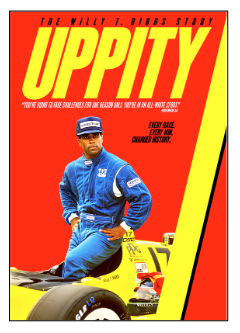May 18, 2019
(May 11, 2019) "The crowd went crazy," historian Donald Davidson recalls in a video about milestones at the Indianapolis Motor Speedway. "It was a truly historic moment."
He's referring to the electrifying moment on May 19, 1991 when, at the last possible opportunity, Willy T. Ribbs became the first African-American driver to qualify for the Indianapolis 500. An earlier qualification attempt by Willy, who was driving for Derrick Walker Racing, had failed because of engine troubles.
His trailblazing achievement at the Speedway - he eventually finished 32nd in the Indy 500 in 1991 - followed years of struggles, including harassment and even death threats when he competed in NASCAR races beginning in the late 1970s. His challenges are recounted in Uppity, a documentary film that had its world premiere in Indianapolis last year.
Willy, 64, discusses his life and racing career as Nelson's guest by phone from Texas, where he lives today. The son of an amateur race driver and plumbing contractor, Willy grew up in San Jose, Calif. In Uppity, Willy recalls how he announced as a 9-year-old that he wanted to be an Indy 500 or Formula One driver - even though he had no African-American role models.

Like Willy, several other former Indy 500 drivers have been Hoosier History Live guests. They include Willy's friends Lyn St. James, who in 1992 became the second woman driver in the Indy 500 (Janet Guthrie was the first, in 1977) and Derek Daly, the Irish racer who settled in central Indiana and became a broadcast analyst. In 2016, Merle Bettenhausen was our studio guest to discuss his racing career and the tragedies that befell his family.
As a boy in California, Willy T. Ribbs was intrigued by motorcycle and auto race drivers who were his father's friends. To launch his career, he moved to England during the mid-1970s and competed in various racing circuits.
Uppity takes its title from one of the derogatory words that detractors used to describe Willy after he returned to the United States and sought to advance in auto racing.
"It wasn't a red-carpet ride," he has said of the challenges involved with his racing career. "But it's one that I'd do over again."
In addition to his history-making achievement in 1991 - which was the 75th running of the Indy 500 - he competed at the Speedway two years later. In 1993, Willy finished 21st in the Indy 500.